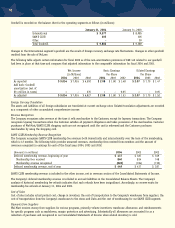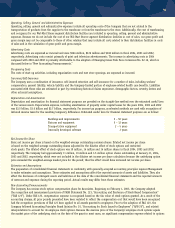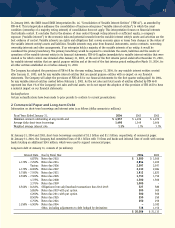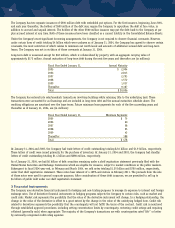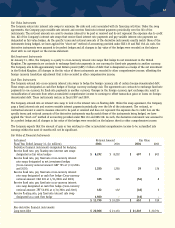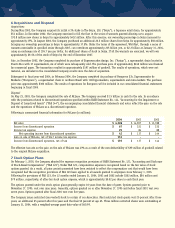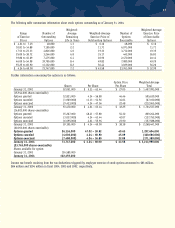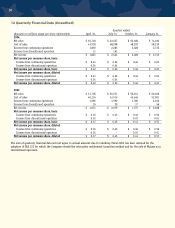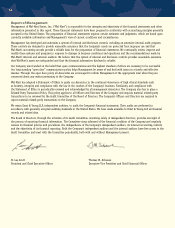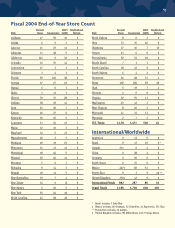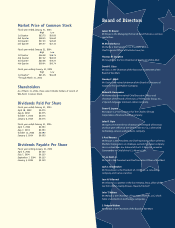Walmart 2004 Annual Report Download - page 50
Download and view the complete annual report
Please find page 50 of the 2004 Walmart annual report below. You can navigate through the pages in the report by either clicking on the pages listed below, or by using the keyword search tool below to find specific information within the annual report.
8 Litigation
The Company is involved in a number of legal proceedings, which include consumer, employment, tort and other litigation. The lawsuits
discussed below, if decided adversely to or settled by the Company, may result in liability material to the Company’s financial condition
or results of operations. The Company may enter into discussions regarding settlement of these and other lawsuits, and may enter into
settlement agreements, if it believes settlement is in the best interests of the Company’s Shareholders. In accordance with FASB
Statement No. 5, “Accounting for Contingencies,” the Company has made accruals with respect to these lawsuits, where appropriate,
which are reflected in the Company’s consolidated financial statements.
The Company is a defendant in numerous cases containing class-action allegations in which the plaintiffs have brought claims under the
Fair Labor Standards Act (“FLSA”), corresponding state statutes or other laws. The plaintiffs in these lawsuits are hourly Associates who
allege, among other things, that the Company forced them to work “off the clock” and failed to provide work breaks. The complaints
generally seek unspecified monetary damages, injunctive relief or both. In North Carolina, Georgia, Texas, Ohio, Louisiana, Wisconsin,
West Virginia, Florida and Michigan, the trial or appellate courts have denied class certification as to all state-law claims. In Louisiana
and Texas, the plaintiffs then amended their pleadings to assert collective actions under the FLSA. A statewide class was certified in
Colorado, but the Order was vacated after settlement. Statewide class actions were certified in Indiana, Massachusetts and Minnesota,
and the rulings have been appealed. In California, the court denied certification of off-the-clock and rest-period damages claims, but
certified a class for meal period claims, as well as certain other classes for injunctive relief only. Class certification claims are yet to be
addressed in a majority of the cases. In Oregon, a federal court denied statewide certification as to state contract off-the-clock claims
but allowed a limited class of opt-in plaintiffs to go to trial on FLSA and state statutory claims. The damages trial was completed on
February 17, 2004. The court will now determine the amount of damages, based on the jury’s findings. The Company does not expect
the amount of damages in Oregon to have a material impact on the Company’s financial condition or results of operations.
The California Department of Labor Standards Enforcement has initiated an investigation of Wal-Mart and SAM’S CLUB for alleged
failures to comply with California wage-and-hour laws. In addition, two putative class actions have been filed in California challenging
the methodology of payments made under various Associate incentive and bonus plans.
The Company is currently a defendant in two putative class actions brought on behalf of assistant store managers who challenge their
exempt status under the FLSA, both of which are pending in federal court in Michigan. Two similar putative class actions challenging
the exempt status of Wal-Mart assistant store managers and photo-center managers under California law have been filed in Los Angeles
County Superior Court. No determination has been made as to class certification in any of these cases.
The Company is a defendant in Dukes v. Wal-Mart Stores, Inc., a putative class-action lawsuit commenced in June 2001 and pending in
the United States District Court for the Northern District of California. The case was brought on behalf of all past and present female
employees in all of the Company’s retail stores and wholesale Clubs in the United States. The complaint alleges that the Company has
engaged in a pattern and practice of discriminating against women in promotions, pay, training and job assignments. The complaint
seeks, among other things, injunctive relief, compensatory damages including front pay and back pay, punitive damages, and attorneys’
fees. A hearing on class certification was held on September 24, 2003, but the court has not yet issued a ruling. There can be no
assurance as to whether a class will be certified or, if a class is certified, as to the geographic or other scope of such a class. If the Court
certifies a class in this action and there is an adverse verdict on the merits, or in the event of a negotiated settlement of the action, the
resulting liability could be material to the Company, as could employment-related injunctive measures, which would result in increased
costs of operations on an ongoing basis.
The Company is a defendant in five putative class-action lawsuits, three of which are pending in Texas, one in New Hampshire, and one
in Oklahoma. In each lawsuit, the plaintiffs seek a declaratory judgment that Wal-Mart and the other defendants who purchased
Corporate-Owned Life Insurance (“COLI”) policies lacked an insurable interest in the lives of the employees who were the insured under
the policies, and seek to recover the proceeds of the policies under theories of unjust enrichment and constructive trust. In some of the
suits, the plaintiffs assert other causes of action, and seek punitive damages. Class certification has not been decided in any of these
cases. In January 2004, the parties to the first-filed Texas lawsuit signed a settlement agreement, which must be approved by the court
in order to become effective. If approved by the court, the settlement will include all Texas COLI claimants who do not opt out of the
settlement class. The amount to be paid by Wal-Mart under the contemplated settlement will not have a material impact on the
Company’s financial condition or results of operations. In the Oklahoma litigation, the court has deferred ruling on plaintiffs’ request to
add 11 additional states to the litigation, pending a ruling on the Company’s motion for summary judgment. The New Hampshire case
was settled in February 2004. The amount of the settlement will not have a material impact on the Company’s financial condition or
results of operations.
48


